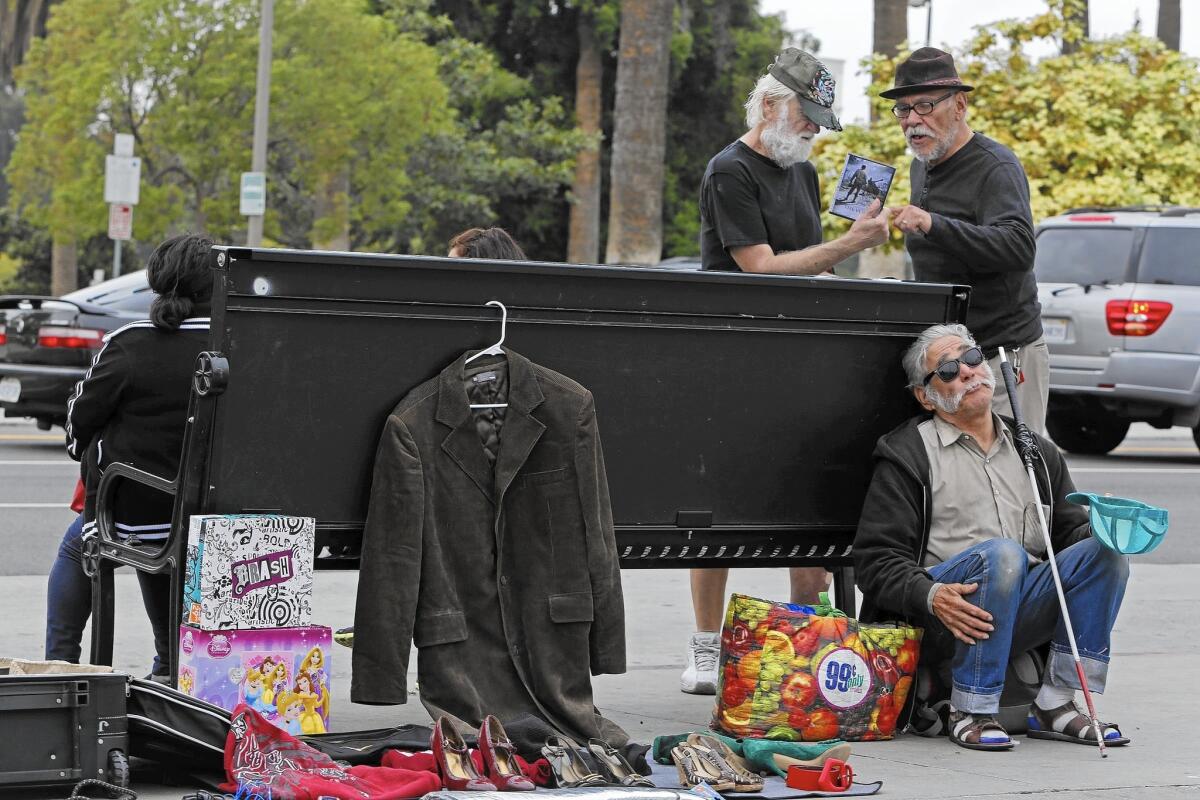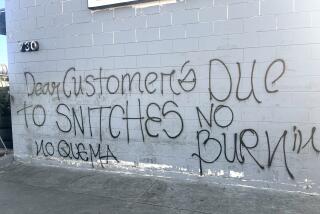L.A. street vendors say police confiscate goods but don’t give receipts

On the hectic sidewalks around MacArthur Park, Guadalupe Aguilar has been ticketed repeatedly for illegally selling her wares.
Each time, Aguilar said, police either trashed or confiscated the shirts and pants that she hawks — without giving her a receipt. The 41-year-old said she spends hundreds of dollars to replace those goods, only to see them discarded the next time police stop her.
That isn’t supposed to happen.
As city leaders wrestle with whether to legalize vending along Los Angeles’ sidewalks and in its parks, it remains a crime punishable by as much as $1,000 in fines, according to the Bureau of Street Services.But police are supposed to provide receipts when ordinary goods are taken away and booked into evidence.
Los Angeles police have challenged some of the allegations made by street vendors, which are under investigation. For example, a sergeant said he had no record of anything being confiscated or destroyed when Aguilar was cited twice in April.
But the story that Aguilar tells is echoed by other vendors along Alvarado Street, where fresh fruit, toys, secondhand clothing and a dizzying array of other goods arepitchedto passersby. At a December news conference near MacArthur Park, a handful of street vendors pleaded in Spanish to be able to keep or at least reclaim their goods.
“You even lose the chair that you sit on,” said Aureliano Santiago, who sells hot dogs and frozen treats.
The question of whether to legalize vending has divided local lawmakers and pitted the economic hopes of thousands of Angelenos who ply their trade on city sidewalks against businesses and neighborhood groups that worry about trash, public health and unfair competition with licensed brick-and-mortar establishments.
As that debate plays out in City Hall, attorneys helping the street vendors question whether police are fairly enforcing the law. The National Lawyers Guild recently wrote a report listing numerous incidents in which L.A. police were alleged to have destroyed property or taken it without handing out receipts.
And they have invoked another case that Los Angeles lost — the battle over whether city workers and police could take items left unattended on sidewalks by homeless people. A federal appeals court found that even if a homeless person had violated a city ordinance by leaving belongings, the city could not seize and destroy his or her property.
The government “may not take property like a thief in the night,” the ruling stated, quoting an earlier case. That holds true “whether the property in question is … a Cadillac or a cart.”
LAPD Cmdr. Dennis Kato said the department is investigating the allegations raised by the street vendors and legal guild. If property is being mishandled by officers, Kato said, “Our job is to train them and educate them.”
But following the rules and writing up every single item seized from street vendors would be “almost an impossible task,” guild attorney Cynthia Anderson-Barker said. The ultimate goal is not simply to get receipts, she said, but to legalize street vending entirely.
Some of those wary of legalized street vending say it makes little sense for police to return illegal food carts.
“If it doesn’t have a proper cooking mechanism, if it’s unsafe, then I don’t know why someone would want it back unless the intent is to use it again illegally,” said Blair Besten, executive director of the Historic Core Business Improvement District downtown.
Some residents and business owners have praised police for confiscating equipment, saying that it reduces the profits for illegal vendors that put neighborhood health and safety at risk.
Street vendors sometimes give police a false address, preventing them from getting their receipt by mail, said Cmdr. Andrew Smith, an LAPD spokesman. In other cases, Smith said street vendors flee, leaving their goods behind. Police then seize and hold the abandoned merchandise, he said.
“When we go out and enforce these laws, we try to bring a humanistic approach,” said Central Division Capt. Don Graham. “Oftentimes we go out with the [county] health department, which provides step-by-step instructions on how they can legally vend” in places where it isn’t banned, he said.
Under California law, health inspectors can impound any food, equipment or utensil that is suspected of being unsanitary or in such disrepair that food could become contaminated.
Graceline Shin, chief health specialist for the Department of Public Health’s street vending program, said the department impounds unpermitted carts and other equipment during sweeps. Vendors have a chance to reclaim those impounded goods if they show up at an office hearing, she said.
“But the majority of the time, they abandon it,” Shin said.
From a bustling corner in MacArthur Park, Anderson-Barker was skeptical of the idea that wrong addresses or other misunderstandings were largely to blame for street vendors not getting receipts. Even when receipts have been given to street vendors, the process to get their goods is often unclear, she said.
“It’s not on the up-and-up, how the vendors are being treated,” she said, before walking off to buy some green corn tamales.
Twitter: @LATimesEmily
More to Read
Start your day right
Sign up for Essential California for news, features and recommendations from the L.A. Times and beyond in your inbox six days a week.
You may occasionally receive promotional content from the Los Angeles Times.







